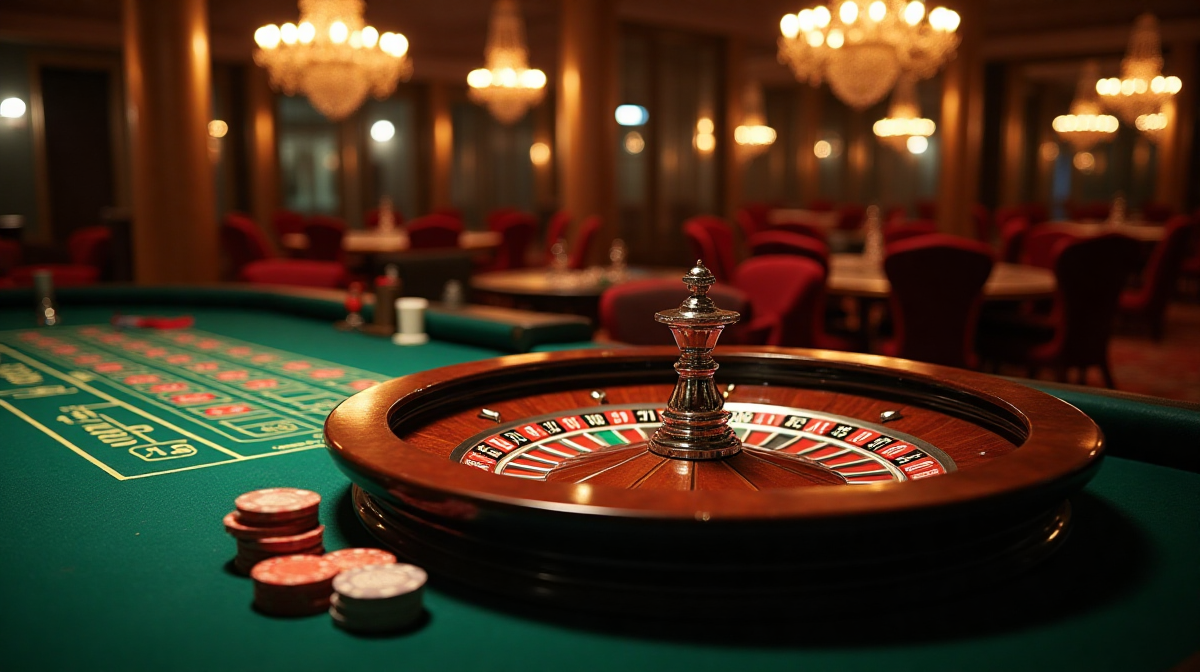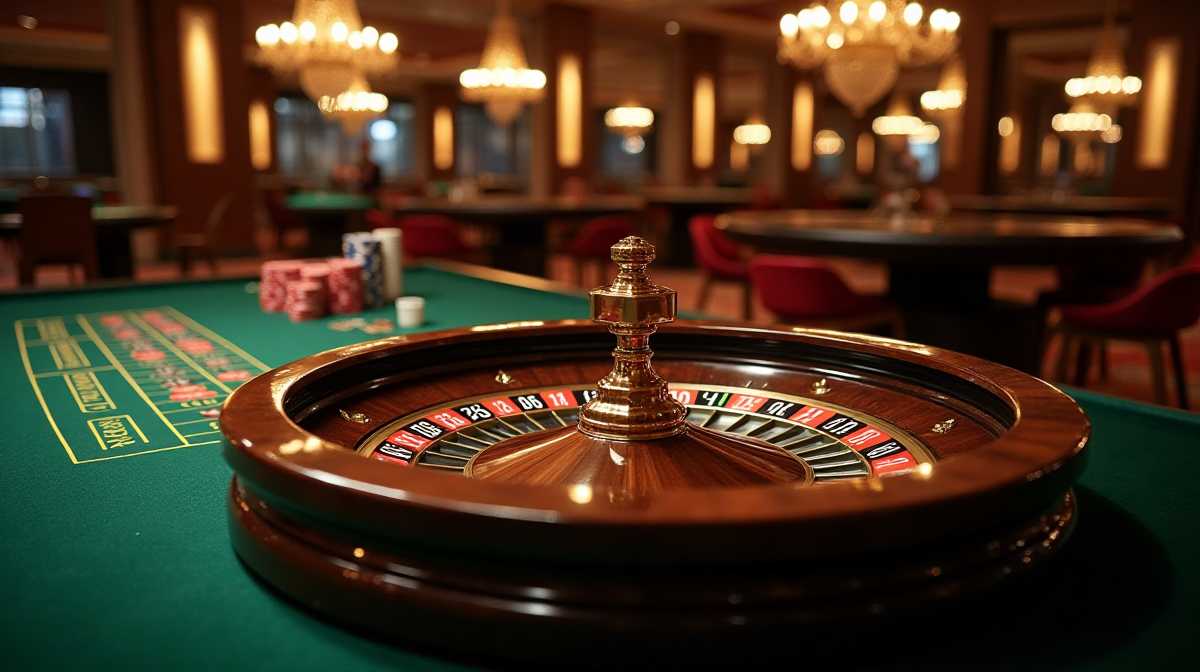Roulette Table Secrets: Beat the Odds?
The Allure of the Roulette Wheel: A Brief History
The roulette wheel, with its captivating spin and the anticipation of where the ball will land, has a rich history dating back to 17th-century France. Developed by Blaise Pascal, initially as an attempt to create a perpetual motion machine, it quickly evolved into the casino game we know today. From the glamorous casinos of Monte Carlo to the modern online world – even accessible through platforms like Bet9ja – roulette continues to enthrall players. The simple yet elegant design and the thrill of chance have made it a staple of gambling culture for centuries.
Is Beating Roulette Possible? Dispelling Myths & Setting Expectations
The question on every roulette player’s mind: can you consistently win? The short answer is no. Roulette is fundamentally a game of chance. Numerous myths and supposed systems promise guaranteed profits, but these are largely based on misunderstandings of probability. While skilled players might employ strategies to manage their bankroll and potentially extend their playing time, eliminating the house edge is exceptionally difficult. Understanding that roulette is primarily entertainment and not a reliable income source is the first step toward responsible play. Many seek out convenient access, leading to the popularity of the bet9ja app download latest version for on-the-go play.
Understanding the Core of Roulette: House Edge Explained
The house edge is the mathematical advantage the casino has over the player. In roulette, this stems from the presence of the ‘0’ (and ‘00’ in American roulette). This means that, over the long run, the casino is statistically guaranteed to win a percentage of all wagers placed. The European roulette wheel, with only one zero, has a lower house edge (2.7%) than the American wheel (5.26%), making it the more favorable option for players.
Decoding the Roulette Wheel: Types and Layout
European vs. American Roulette: Key Differences & Their Impact
The most significant difference between European and American roulette lies in the wheel layout. The American wheel includes both a ‘0’ and a ‘00’, increasing the number of possible outcomes and, consequently, the house edge. European roulette, with only a single ‘0’, offers better odds for players. This seemingly small difference significantly impacts long-term profitability.
Understanding the Roulette Table Layout: Inside & Outside Bets
The roulette table features a grid of numbers, colored red or black, alongside various betting options. Inside bets are placed on specific numbers or small groups of numbers (e.g., straight up, split, corner). These offer higher payouts but have lower probabilities of winning. Outside bets, such as red/black, even/odd, or dozens, cover larger sections of the table, offering lower payouts but higher win probabilities. Bet9ja sh9p often offers a variety of roulette options, showcasing these different bet types.
The Number Sequence & Its Relevance
While the numbers on the roulette wheel aren't arranged sequentially, the layout is designed to alternate between red and black, and high and low numbers. Some players believe this impacts the randomness, but statistically, each spin is independent of the last. The number sequence has limited relevance to predicting future outcomes.
Understanding Roulette Bets & Payouts
Inside Bets: Straight Up, Split, Street, Corner, Six Line – Payouts & Probabilities
Inside bets target specific numbers or small groups. A straight-up bet (on a single number) pays 35 to 1, but has a low probability of hitting. Split bets (on two adjacent numbers) pay 17 to 1. Street bets (on a row of three numbers) pay 11 to 1. Corner bets (on a square of four numbers) pay 8 to 1, and Six Line bets (on two adjacent rows) pay 5 to 1.
Outside Bets: Red/Black, Even/Odd, High/Low, Dozens, Columns – Payouts & Probabilities
Outside bets offer more favorable odds. Red/Black, Even/Odd, and High/Low bets all pay 1 to 1. Dozens bets (1-12, 13-24, 25-36) pay 2 to 1. Column bets pay 2 to 1 as well. These bets have a nearly 50% chance of winning (slightly less due to the ‘0’ or ‘00’).
Called Bets : Voisins, Tiers, Orphelins – For the Experienced Player
Called bets, or voice bets, are more complex wagers often found in land-based casinos. They cover specific sections of the wheel and require a more in-depth understanding of the roulette layout. Examples include Voisins du Zero, Tiers du Cylindre, and Orphelins.
Roulette Strategies: Separating Fact from Fiction
The Martingale System: Risks & Misconceptions
The Martingale system involves doubling your bet after each loss, aiming to recover all previous losses with a single win. While it can work in the short term, it requires a substantial bankroll and faces table limits. A losing streak can quickly exhaust your funds.
Reverse Martingale : A Less Risky Approach?
The Reverse Martingale (Paroli) system involves doubling your bet after each win. It's less risky than the Martingale, but still relies on luck and doesn't guarantee profits.
D'Alembert System: Gradual Betting Increases
The D'Alembert system involves increasing your bet by one unit after a loss and decreasing it by one unit after a win. It's a more conservative approach, but still doesn't overcome the house edge.
Fibonacci Sequence Strategy: Following the Flow
The Fibonacci strategy uses the Fibonacci sequence (1, 1, 2, 3, 5, 8, 13…) to determine bet sizes. It’s another attempt to manage losses, but it doesn’t eliminate the casino’s advantage.
Labouchere System : A Complex Approach
The Labouchere system involves creating a sequence of numbers and betting the sum of the first and last numbers. It’s complex and can lead to significant losses if a losing streak occurs.
Why All Betting Systems Ultimately Fail
All betting systems are based on the flawed premise that past results can influence future outcomes. Roulette spins are independent events. The law of averages dictates that, over the long run, the house edge will prevail. Some players even search for anime roulette codes hoping for an edge, but these are typically unrelated to actual roulette outcomes.

Bankroll Management: The Cornerstone of Responsible Play
Setting a Budget: Before You Spin the Wheel
Before you start playing, determine a budget you’re comfortable losing. Never gamble with money you can’t afford to lose.
Betting Units & Stake Sizes: Finding Your Sweet Spot
Divide your bankroll into smaller betting units. This allows you to play for longer and ride out losing streaks.
Knowing When to Stop: Profit and Loss Limits
Set both profit and loss limits. If you reach your profit goal, cash out and walk away. If you reach your loss limit, stop playing.
Avoiding Chase Losses: A Recipe for Disaster
Never try to recover losses by increasing your bets. This is a common mistake that can quickly lead to financial ruin.
Advanced Roulette Concepts
Wheel Bias: Combining Observation with Statistical Analysis
Wheel bias refers to the possibility that a roulette wheel might have imperfections causing certain numbers to land more frequently. While theoretically possible, modern casino wheels are rigorously tested to prevent bias. Exploiting wheel bias is often illegal.
Visual Ballistics: Predicting Sector Landings - Skill or Luck?
Visual ballistics involves observing the speed of the ball and the wheel to predict where the ball will land. It requires significant skill and practice and is still subject to a large degree of luck.
Software & Tools: Exploring Roulette Simulators and Trackers
Roulette simulators and trackers can be useful for practicing strategies and analyzing results. However, they cannot predict future outcomes. Be wary of software claiming to guarantee profits.

Online vs. Land-Based Roulette: What’s the Difference?
Random Number Generators & Fair Play in Online Roulette
Online roulette uses Random Number Generators (RNGs) to ensure fair and random outcomes. Reputable online casinos have their RNGs independently tested and certified.
Live Dealer Roulette: Bringing the Casino Experience Home
Live dealer roulette offers a more immersive experience, with a real dealer streaming live from a casino studio.
Security & Trust: Choosing Reputable Online Casinos
When playing online, choose a reputable casino with a valid license and secure payment methods.
Realistic Expectations & Responsible Gambling
Roulette is a Game of Chance: Accepting the Randomness
Accept that roulette is a game of chance and that there’s no foolproof way to win.
The Importance of Entertainment: Playing for Fun, Not Profit
Play roulette for entertainment, not as a source of income.
Recognizing Problem Gambling: Resources & Support
If you think you might have a gambling problem, seek help. Numerous resources are available, including support groups and counseling services.
Setting personal limits and sticking to them.
Establish clear boundaries for your gambling activities and consistently adhere to them.
Conclusion: Can You Really Beat the Odds?
Recap: The Limitations of Roulette Secrets
Despite countless claims and strategies, consistently beating roulette is statistically impossible. The house edge ensures the casino maintains an advantage over the long run.
Focus on Smart Play & Responsible Gambling
Focus on managing your bankroll, setting limits, and playing responsibly.
Final Thoughts: Enjoy the Game!
Roulette is a thrilling game of chance. Embrace the randomness, enjoy the experience, and remember to gamble responsibly. Whether enjoying a game at a casino or through the Bet9ja platform, prioritize fun and stay within your limits.


